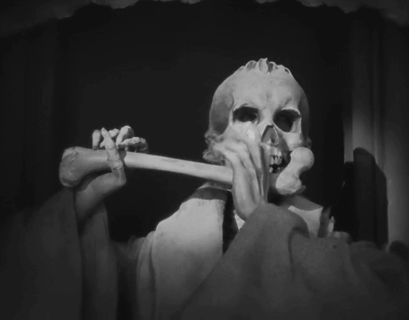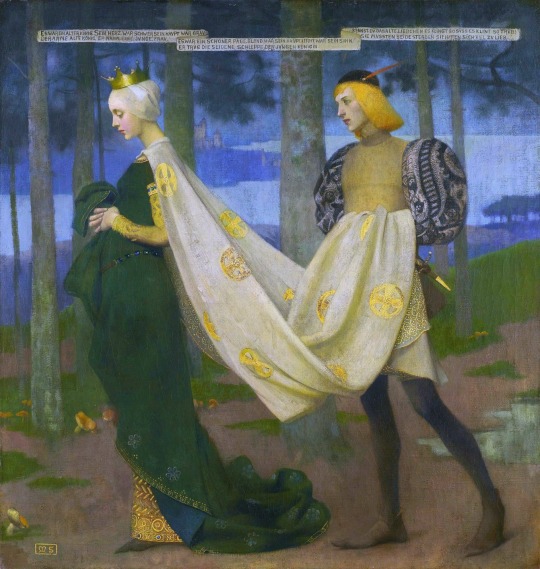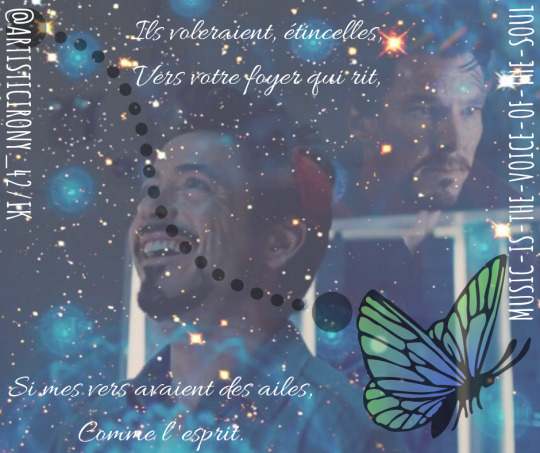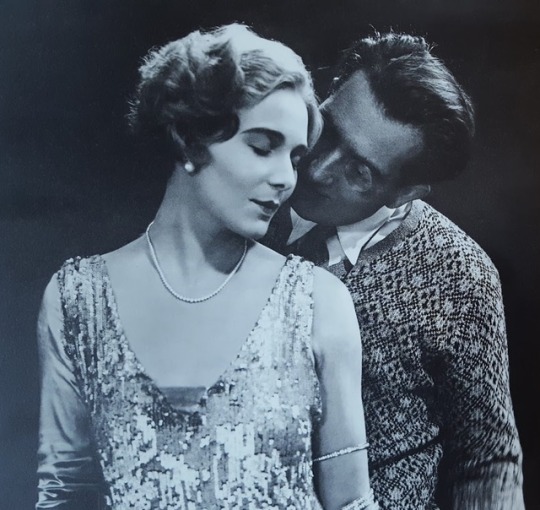#English translation Richard Stokes
Text
The crow and the fox
Master Crow, perched on an oak,
Was holding a cheese in his beak.
Master Fox, lured by the scent,
Spoke more or less like this:
‘Good day, my dear Sir Crow,
How smart you are! How debonair you are!
In truth, if your song
Be as fine as your plumage,
You are the phoenix of these woods.’
At this, the crow grew wild with glee;
And to display his minstrelsy,
He opens a big beak and drops his booty.
The fox snaps it up, saying: ‘My dear sir,
Learn that every flatterer
Depends on an audience to live at ease.
This lesson is doubtless cheap at a cheese.’
The crow, shamefaced and in troubled state,
Vowed to be tricked no more – a little late.
2 notes
·
View notes
Text
HI!
Welcome to our Lovecraft oc&canon ask! Our goal is to gather a big and friendly community for fun and entertainment.
In our ask, you can take a role of a canon character or your oc. We are glad to see all kind of art and text answers. Just choose one and contact me @scientific-dog or @aromatenmalen to join our family!
1. English is the main language in our ask. If you don’t speak fluently, it’s ok, you may write us – we can help you with translating and editing.
2. You have unlimited amount of roles you can take. If you handle it, of course! Role can be taken by more than one person.
3. We have NO deadlines. Our opinion is that art should be free and unbound. We don’t want our ask to be a job. We will not kick you out if you are absent for months. Take your time and be back when you will feel comfortable to continue. But please, remember, that as soon as you joined us, the subscribers would like to see your activity.
4. Please, be polite with all other participants.
5. The text volume should not be less than 200 words, art should be in a good quality and all the text on it should be readable.
DETAILS
1. To apply your answer, contact @scientific-dog and @aromatenmalen. We will post your art/text manually.
2. To ask the question use the ask box. PLEASE, if you see that we have more than one person answering for this character, indicate the particular author you want to ask. We can have MORE than one creator per character.
3. If you want to apply, you must have a character welcoming post . This is your first and the most important work where you have to express briefly your opinion and statement about the character. You may draw a small comic, or art which explains your persona, or art and text both. It should contain: your character name, art/text/both, and your contacts you wish to be described: insta, twitter, telegram etc.
4. You may ask common questions, which is not directed to certain one, and which could be used by different authors for their characters
MEET OUR CHARACTERS!
And stay tuned for the welcoming posts...
CANON:
@aromatenmalen: Hastur, Howard Lovecraft
@slepoepyatno: Richard Upton Pickman, Nyarlathotep
@aeternal-nightmare: Nephren-Ka, Titus Crow
@shapter-draws: Randolph Carter, Henri-Laurent de Marigny
OC:
@ramalakeven: Jesslyn
@makosxa: Yisthigas, Eddie, Kattho-Ha, Shaxa, Emmanuel Wynn de Llewellyn
@scientific-dog: Vivian Stokes, Watson van der Berg, Daniel Heilman, Derek Kennet
20 notes
·
View notes
Text
Re-listening to Danse Macabre, an old fashioned waltz — bits and pieces from a good omens fan.
Et vive la mort et l’égalité!

My take: something has been lost when looking at this lovely tone poem if all we get is awfulness or despair. This dance is the embodiment of seizing the day (or night in this case) even past death.

First though, if you’re into this kind of thing, is some analysis of how it is constructed.
Everything is meant. “The piece begins with twelve repeated notes from the harp, signifying a clock striking midnight. The violin scratches out a series of imperfect fifths that do not resolve as they should in well-mannered tonal music. The devil is warming up to play a diabolical dance in a fast waltz time. The waltz had only lately become respectable.”

The original song-poem lyrics with English translation can be found here. More thoughts under the cut:
It’s hard to hope that links speak for themselves if someone is skimming a goofy post like this. The lyrics, then, French and English:
“Danse macabre
Zig et zig et zig, la mort cri en cadence
Frappant une tombe avec son talon,
La mort à minuit joue un air de danse,
Zig et zig et zag, sur son violon.
Le vent d’hiver souffle, et la nuit est sombre,
Des gémissements sortent des tilleuls;
Les squelettes blancs vont à travers l’ombre
Courant et sautant sous leurs grands linceuls,
Zig et zig et zig, chacun se trémousse,
On entend claquer les os des danseurs,
Un couple lascif s’asseoit sur la mousse
Comme pour goûter d’anciennes douceurs.
Zig et zig et zag, la mort continue
De racler sans fin son aigre instrument.
Un voile est tombé! La danseuse est nue!
Son danseur la serre amoureusement.
La dame est, dit-on, marquise ou baronne.
Et le vert galant un pauvre charron—
Horreur! Et voilà qu’elle s’abandonne
Comme si le rustre était un baron!
Zig et zig et zig, quelle sarabande!
Quels cercles de morts se donnant la main!
Zig et zig et zag, on voit dans la bande
Le roi gambader auprès du vilain!
Mais psit! tout à coup on quitte la ronde,
On se pousse, on fuit, le coq a chanté…
Oh! La belle nuit pour le pauvre monde!
Et vive la mort et l’égalité!
*
Tap, tap, tap—Death rhythmically (1997) English translation © Richard Stokes
Tap, tap, tap—Death rhythmically,
Taps a tomb with his heel,
Death at midnight plays a gigue,
Tap, tap, tap, on his violin.
The Winter wind blows, the night is dark,
The lime-trees groan aloud;
White skeletons flit across the gloom,
Running and leaping beneath their huge shrouds
Tap, tap, tap, everyone’s astir,
You hear the bones of the dancers knock,
A lustful couple sits down on the moss,
As if to savour past delights.
Tap, tap, tap, Death continues,
Endlessly scraping his shrill violin
A veil has slipped! The dancer’s naked!
Her partner clasps her amorously.
They say she’s a baroness or marchioness,
And the callow gallant a poor cartwright.
Good God! And now she’s giving herself,
As though the bumpkin were a baron!
Tap, tap, tap, what a saraband!
Circles of corpses all holding hands!
Tap, tap, tap, in the throng you can see
King and peasant dancing together!
But shh! Suddenly the dance is ended,
They jostle and take flight—the cock has crowed…
Ah! Nocturnal beauty shines on the poor!
And long live death and equality!”
Look, these words and the instrument choices speak of equality in the state of death. Possibly a bit the way Crowley would.

Death wasn’t and couldn’t be hidden politely during those days. The arts featured the dance of the dead, just as we still see Memento Mori in media today. The balance of return from oblivion to celebrate outside of hierarchies was not new. Even the dead could still seize the night. Joy does not die.

Remember Crowley saying that people will be equally dead whether they are killed by Heaven or Hell up in that graphic? If anything, this little note from the domesticated Bentley might be a little rebellion, if not overkill. Maybe it’s A Clue to Aziraphale that they might celebrate a little late if he insists on this trip while ignoring Crowley, just as the Bentley’s musical gift to Crowley of the Nightingale reprise in season two.

Look at what the lyrics said.
The dance was already a part of folk custom or lore, and the xylophone was a country instrument. Saint Saëns was well aware of this, and used both the barely acceptable waltz as the dance and coarse instrument of country-folk. This was done deliberately.
This conservative, restrained composer made choices throughout the work. A dance which had been scandalous not so long ago and an instrument ‘of the people’ so to speak. Composed to fit the exacting pattern of “the devil’s interval”which you can read about here, too (yes it can matter). I’m a geek for this kind of thing so here’s that link again.
The idea of the dance already existed, what he did was to elevate it to something so moving and strong that it endures today, despite its original reception by his contemporaries.
The message of the lyrics is lost in the final product, which is a pity for Good Omens fans, but the delight in the dance remains. There is a freedom, celebration and again, an equality among the freed dancers. (Crepes, anyone?) They take their joy where they can, even if the devil plays the tune.
Like Orff’s Carmina Burana, another work celebrating earthly delights and perils, (Ox rib anyone?) O Fortuna being the most recognizable of this work, Danse Macabre is often used to enhance or promote something only in fragments, very specifically omitting the resolved and therefore to me, ‘peaceful’ end to both works.

I seldom hear the resolution of the frantic dance in the promotion of a scary movie or even as used in Hush, an episode of Buffy (yes, the one with The Gentlemen, on one of the links). This does Danse Macabre a great disservice. The point and the peace are cut off abruptly, leaving the listener waiting for the music to knit itself up at dawn. For this listener, the omission is a constant irritant, but I am perhaps an odd duck. I do have ears though, and they know the difference between resolved and not.

It’s oddly like a cliffhanger, really, when only part of the work is played.
While some people say that this piece is “suffocating” or “overwhelming” I can only wonder at the variety of human experience. There is so much unencumbered joy in Danse Macabre, so much literal freedom of the souls to have this time to celebrate.
Young children are routinely introduced to classical music with this piece. If it were so utterly fearsome, it would be a poor choice indeed for such a task.
What it is, without a doubt, is a composition in old fashioned waltz time that goes far from the norm while following a form.
What else could the Bentley give Aziraphale but that truly intimate dance, a waltz, to the tune of equals and a taste of brimstone?

After all, he has standards.

#good omens#danse macabre#not really done#earthly delights#ox ribs#carpe diem#memento mori#i am not an expert#I just like stuff#image description on alt text#image description in alt#music in good omens 2
13 notes
·
View notes
Text

Marianne Stokes (Austrian, 1855 - 1927), The Queen and the Page, 1896, oil on canvas, private collection. Illustration of Heinrich Heine's "Es war ein alter König."
Banner reads:
Es war ein alter König,
Sein Herz war schwer, sein Haupt war grau;
Der arme alte König,
Er nahm eine junge Frau.
Es war ein schöner Page,
Blond war sein Haupt, leicht war sein Sinn;
Er trug die seidne Schleppe
Der jungen Königin.
Kennst du das alte Liedchen?
Es klingt so süß, es klingt so trüb!
Sie mußten beyde sterben,
Sie hatten sich viel zu lieb.
👑
English translation by © Richard Stokes
There was an aged monarch,
His heart was sore, his head was grey;
The poor and aged monarch,
He took a youthful wife.
There was a handsome page-boy,
His head was blond, his heart was light;
He carried the silken train
Behind the youthful queen.
Do you know the age-old story?
It sounds so sweet, it sounds so sad!
Both of them had to die,
They loved each other too much.
17 notes
·
View notes
Text
Colloque sentimental (Paul Verlaine in Fêtes Galantes)
Dans le vieux parc solitaire et glacé
Deux formes ont tout à l'heure passé.
Leurs yeux sont morts et leurs lèvres sont molles,
Et l'on entend à peine leurs paroles.
Dans le vieux parc solitaire et glacé
Deux spectres ont évoqué le passé.
- Te souvient-il de notre extase ancienne?
- Pourquoi voulez-vous donc qu'il m'en souvienne?
- Ton coeur bat-il toujours à mon seul nom?
Toujours vois-tu mon âme en rêve? - Non.
Ah ! les beaux jours de bonheur indicible
Où nous joignions nos bouches ! - C'est possible.
- Qu'il était bleu, le ciel, et grand, l'espoir !
- L'espoir a fui, vaincu, vers le ciel noir.
Tels ils marchaient dans les avoines folles,
Et la nuit seule entendit leurs paroles.
Lover's dialogue
English translation © Richard Stokes
In the ancient park, deserted and frozen,
Two shapes have just passed by.
Their eyes are dead and their lips are lifeless,
And their words can hardly be heard.
In the ancient park, deserted and frozen,
Two spectres were recalling the past.
—Do you remember our past rapture?
—What would you have me remember?
—Does your heart still surge at my very name?
Do you still see my soul when you dream?—No.
—Ah, the beautiful days of inexpressible bliss
When our lips met!—It may have been so.
—How blue the sky, how hopes ran high!
—Hope has fled, vanquished, to the black sky.
So they walked on through the wild grasses,
And the night alone heard their words.
Translation © Richard Stokes, author of A French Song Companion (Oxford, 2000)
4 notes
·
View notes
Note
I enjoyed listening to SHWEP and am checking out Perdido Street Station thanks to your posts. Would you mind sharing some more of your favourite media?
this is kind of a grab bag but here ya go: lord of the rings, the silmarillion, the children of hurin, anything by kazuo ishiguro, anything by haruki murakami, 100 years of solitude, love in the time of cholera, anything by jorge luis borges, terry pratchett's discworld series, neil gaiman's sandman series, njal's saga, egil's saga, the saga of hervor and heidrek, the rediscovery of man by cordwainer smith, anything by raymond chandler, anything by iain banks, the city and the city by china mieville, plus the two sequels to perdido street station, the inverted world by christopher priest, a canticle for liebowitz by walter miller, anything by octavia butler, anything by ursula le guin, anything by jane austen, gawain and the green knight, pearl (the middle english poem, not the steinbeck novel), as i lay dying by william faulkner, anything by kurt vonnegut, rice boy by evan dahm and its follow up vattu (both available in their entirety online), fine structure by qntm (also online), "the man who ate michael rockefeller" by christopher stokes, tooth and claw (the story collection) by t.c. boyle, frankenstein, hyperion by dan simmons and its sequels, house of leaves, waterland, the making of the atomic bomb by richard rhodes, anything by roger zelazny, edgar rice burroughs' barsoom series, ray bradbury's short fiction, dune, hart's hope by orson scott card (and his collected fiction, maps in a mirror), paradise lost, the andrew george translation of the epic of gilgamesh
(books i wouldn't recommend, exactly, but which had a formative effect on my taste include hart's hope by orson scott card, his short fiction omnibus maps in a mirror, dune, paradise lost, and the work of james joyce)
if you like scripted and informative podcasts, i will never stop recommending mike duncan's history of rome or revolutions, both of which are terrific. there's also a history of byzantium podcast that picks up where mike duncan left off with rome that is quite good, though i haven't listened to all of it.
#video games are harder to recommend bc people's gameplay tastes are so particular#if you don't like strategy games you're not gonna like SMAC#no matter how good the aesthetic is#and i'm not a big movie watcher#i do watch tv shows#but few i would *recommend* really#they're mostly background noise for other things#like podcasts
27 notes
·
View notes
Text
Classical Music in La Corda (Part 2)
Related Links:
An Introduction to La Corda
Classical Music in La Corda (Part 1)
(Article also available on Medium)
===
La Corda d’Oro (Kiniro no Corda, 金色のコルダ), published by KOEI in 2003

The below list of pieces appeared in the game La Corda d’Oro that was first released on September 19, 2003.
===
Air on the G String (G線上のアリア)
Composer: Johann Sebastian Bach (バッハ)
Category: elegant (清麗)
Keywords: passion, compliment, determination, reputation, aura, people, confidence, flower, life
This piece originates from Bach’s Orchestral Suite №3 that is called “Air”. In the arrangement by August Wilhelmj (in 1871), the violin melody is transposed such that the entire piece can be played on the violin’s lowest string (i.e. the G string). While the original key of Bach’s version is in D major, Wilhelmj’s version is in C major.
Romanze (ロマンスト長調)
Composer: Max Reger (レーガー)
Category: vivid (彩華)
Keywords: resonance, creation, bride, student, education, passion, hometown, youth, home
Romance (Romanze in German) generally refers to any vocal or instrumental piece that has a tender, lyrical quality. This piece, originally for violin and piano (original version), was first published in the magazine Neue Musikzeitung in 1901. It now has multiple different versions, including for flute, clarinet and cello.
Valse Sentimentale (感傷的なワルツ)
Composer: Pyotr Ilyich Tchaikovsky (チャイコフスキー)
Category: gloomy (愁情)
Keywords: despair, dream, admiration, dedication, goddess, love, encounter, suffocation, marriage
Valse Sentimentale is one of the “Six Pieces (Six morceaux) for solo piano”, Op. 51 that Tchaikovsky wrote for the bourgeois salons in 1882. Each of the piece is dedicated to a different person, and the final movement Valse Sentimentale is dedicated to Emma Genton — an important woman in Tchaikovsky’s life. The melancholic melody gives a sense of romance while vividly depicts the image of a beautiful woman. My personal favourite is this version arranged for violin.
Sicilienne (シチリアーノ)
Composer: Anonymous
Category: elegant (清麗)
Keywords: family, children, goal, passion, promise, prospect, career
According to the official fanbook or the game, Sicilienne is composed by the blind Austrian Maria Theresia von Paradis (パラディス). Say even in this online video, the piece is attributed to Paradis. However, latest research revealed that it is very likely a musical hoax by violinist Samuel Dushkin, who published the piece in 1924.
Sicilienne (also known as siciliano or siciliana), is a form of dance music for Sicilian folk dance in Italy, which was popular during the 17th and 18th centuries. The genre is often characterised by dotted rhythms and gives a pastoral feel.
Humoresques (ユーモレスク)
Composer: Antonín Dvořák (ドヴォルザーク)
Category: vivid (彩華)
Keywords: childhood, celebration, resonation, desire, heart
This piece was written when Dvořák returned to his homeland Czechoslovakia (now The Czech Republic) during the summer of 1984. He had been working as the director of the Conservatory in New York in the United States between 1892 and 1895. The piece was originally composed for the piano, comprised of both Czech and American style melodies.
Later, Dvořák’s Humoresque №7 became the tune that can be heard on passenger train toilets in the United States — the singing begins with “Passengers will please refrain from flushing toilets while the train is standing…” (full song here).
Après un rêve (夢のあとに)
Composer: Gabriel Fauré (フォーレ)
Category: gloomy (愁情)
Keywords: sentiment, unrequited love, reputation, farewell, self, dream, quietude, reputation, longing
Après un rêve (After a dream in English) is one of the pieces from Trois mélodies that Fauré wrote for solo voice and piano between 1870 and 1877. The lyrics originates from an Italian poem that recounts a dream where one’s beloved can be seen. The following shows the translation in English by Richard Stokes:
In sleep made sweet by a vision of you
I dreamed of happiness, fervent illusion,
Your eyes were softer, your voice pure and ringing,
You shone like a sky that was lit by the dawn;
You called me and I departed the earth
To flee with you toward the light,
The heavens parted their clouds for us,
We glimpsed unknown splendours, celestial fires.
Alas, alas, sad awakening from dreams!
I summon you, O night, give me back your delusions;
Return, return in radiance,
Return, O mysterious night!
In the game you could play this piece with a violin duet, and I really like the arrangement. Unfortunately I cannot find anything similar online, but this is another arrangement for 2 violins and piano.
===
Thank you for reading!
Reference: 金色のコルダ コンプリートガイド
2 notes
·
View notes
Text
Si Mes Vers Avaient Des Ailes



This is for @laisocasblog-blog . I got them as my giftee for this exchange. I enjoyed making this edit. This idea came to me from a dream.
I’ve always had this idea of Stephen writing notes or giving love poems to Tony in different languages, and this poem always came to mind first. It’s cuz Stephen, in IW, used butterflies against Thanos. In the second stanza, his love verses would flutter to Tony’s smiling hearth/home and that’s why the second edit had him smiling. Here’s a YouTube video of the poem/song. It’s really beautiful.
Victor Hugo wrote this poem, which was then made into a song. Reynaldo Hahn wrote the music to the poem.
Mes vers fuiraient, doux et frêles,
Vers votre jardin si beau,
Si mes vers avaient des ailes,
Comme l’oiseau.
Ils voleraient, étincelles,
Vers votre foyer qui rit,
Si mes vers avaient des ailes,
Comme l’esprit.
Près de vous, purs et fidèles,
Ils accourraient nuit et jour,
Si mes vers avaient des ailes,
Comme l’amour.
English translation:
My verses would flee, sweet and frail,
To your garden so fair,
If my verses had wings,
Like a bird.
They would fly, like sparks,
To your smiling hearth,
If my verses had wings,
Like the mind.
Pure and faithful, to your side,
They’d hasten night and day,
If my verses had wings,
Like love!
Translations by Richard Stokes, from A French Song Companion (Oxford, 2000)
AO3 Link
#ironfeyworks#fanwork#ironstrange#magitech#doctor strange#iron man#marvel cinematic universe#mcu#stephen strange#strangeiron#tony stark#iron's AUs
3 notes
·
View notes
Text
youtube
La chanson d'Ève, Op. 95, is a song cycle by Gabriel Fauré, of ten mélodies for voice and piano. Composed during 1906–10, it is based on the collection of poetry of the same name by Charles van Lerberghe. It is Fauré's longest song cycle.
Ô mort, poussière d'étoiles
Charles van Lerberghe
Ô mort, poussière d’étoiles,
Lève-toi sous mes pas!
Viens, ô douce vague qui brille
Dans les ténèbres;
Emporte-moi dans ton néant!
Viens, souffle sombre où je vacille,
Comme une flamme ivre de vent!
C’est en toi que je veux m’étendre,
M’éteindre et me dissoudre,
Mort, où mon âme aspire!
Viens, brise-moi comme une fleur d’écume.
Une fleur de soleil à la cime
Des eaux,
Et comme d’une amphore d’or
Un vin de flamme et d’arome divin,
Épanche mon âme
En ton abîme, pour qu’elle embaume
La terre sombre et le souffle des morts.
O death, starry dust
English Translation © Richard Stokes
O death, starry dust,
Rise up where I tread!
Come, gentle wave that shines
In the darkness:
Bear me off into your void!
Come, dark sigh in which I tremble,
Like a wind-intoxicated flame!
It is in you that I wish to be absorbed,
To be extinguished and dissolved,
Death, to which my soul aspires!
Come, break me like a flower of foam,
A speck of sun in the crest
Of the waves,
And like a golden amphora’s
Flaming wine of heavenly fragrance,
Pour my soul
Into your abyss, that it might perfume
The dark earth and the breath of the dead.
4 notes
·
View notes
Text
The beautiful song Stephan Jänicke (Anton von Lucke) translates for his deaf parents in S1E3 of Babylon Berlin, the magnificent German TV series (definitely up there with my favorite scenes of the whole show). The lyrics, based on a poem by Friedrich Rückert, in German and English below. Performed by the legendary German mezzo-soprano Christa Ludwig with the Philharmonia Orchestra.
Ich bin der Welt abhanden gekommen (Gustav Mahler)
Ich bin der Welt abhanden gekommen,
Mit der ich sonst viele Zeit verdorben,
Sie hat so lange nichts von mir vernommen,
Sie mag wohl glauben, ich sei gestorben!
Es ist mir auch gar nichts daran gelegen,
Ob sie mich für gestorben hält,
Ich kann auch gar nichts sagen dagegen,
Denn wirklich bin ich gestorben der Welt.
Ich bin gestorben dem Weltgetümmel,
Und ruh’ in einem stillen Gebiet!
Ich leb’ allein in meinem Himmel,
In meinem Lieben, in meinem Lied!
I am lost to the world
With which I used to waste much time;
It has for so long known nothing of me,
It may well believe that I am dead.
Nor am I at all concerned
If it should think that I am dead.
Nor can I deny it,
For truly I am dead to the world.
I am dead to the world’s tumult
And rest in a quiet realm!
I live alone in my heaven,
In my love, in my song!
Translation © Richard Stokes, author of The Book of Lieder (Faber, 2005)
youtube
9 notes
·
View notes
Text


Death & the Maiden
Romeo and Juliet, William Shakespeare // The Girl and Death, Richard Bergh // Death Takes a Holiday // Death and the Maiden Choreographed by Robert North // The Angel of Death, Domenico Morello // The Angel of Death, Evelyn De Morgan // Matthias Claudius' Der Tod und das Mädchen translated by Richard Wigmore // excerpts from an interview with Stephen Thoss // Death and the Maiden, Marianne Stokes // O Death, Jen Titus // Death and the Maiden, Robert Lenkiewicz // Ode to a Nightingale, John Keats // The Young Woman and Death, Henry Lévy // Elisabeth das Musical (English Translation) // The Kiss, Ambrogio Antonio Alciati // (Don't Fear) the Reaper, Blue Öyster Cult // Emily Dickinson, Because I could Not Stop for Death
#death and the maiden#web weaving#aesthetic compilation#aesthetic#death#aes: death and the maiden#edit#my edits
237 notes
·
View notes
Text
Si Mes Vers Avaient Des Ailes
This is for @laisocasblog I got them as my giftee for this exchange. I enjoyed making this edit. This idea came to me from a dream.



I’ve always had this idea of Stephen writing notes or giving love poems to Tony in different languages, and this poem always came to mind first. It’s cuz Stephen, in IW, used butterflies against Thanos. In the second stanza, his love verses would flutter to Tony’s smiling hearth/home and that’s why the second edit had him smiling. Here’s a YouTube video of the poem/song. It’s really beautiful.
Victor Hugo wrote this poem, which was then made into a song. Reynaldo Hahn wrote the music to the poem.
Mes vers fuiraient, doux et frêles,
Vers votre jardin si beau,
Si mes vers avaient des ailes,
Comme l’oiseau.
Ils voleraient, étincelles,
Vers votre foyer qui rit,
Si mes vers avaient des ailes,
Comme l’esprit.
Près de vous, purs et fidèles,
Ils accourraient nuit et jour,
Si mes vers avaient des ailes,
Comme l’amour.
English translation:
My verses would flee, sweet and frail,
To your garden so fair,
If my verses had wings,
Like a bird.
They would fly, like sparks,
To your smiling hearth,
If my verses had wings,
Like the mind.
Pure and faithful, to your side,
They’d hasten night and day,
If my verses had wings,
Like love!
Translations by Richard Stokes, from A French Song Companion (Oxford, 2000)
#izzy loves marvel#izzy makes edits#ironstrange#ironstrange art#ironstrangegiftexchange#tony stark#stephen strange#izzy creates fanwork
76 notes
·
View notes
Photo

“Ich denke dein, wenn mir der Sonne Schimmer vom Meere strahlt;
Ich denke dein, wenn sich des Mondes Flimmer in Quellen malt.
Ich sehe dich, wenn auf dem fernen Wege der Staub sich hebt;
In tiefer Nacht, wenn auf dem schmalen Stege der Wandrer bebt.
Ich höre dich, wenn dort mit dumpfem Rauschen die Welle steigt.
Im stillen Haine geh ich oft zu lauschen, wenn alles schweigt.
Ich bin bei dir, du seist auch noch so ferne.
Du bist mir nah!
Die Sonne sinkt, bald leuchten mir die Sterne.
O wärst du da!”
(Johann Wolfgang von Goethe)
“I think of you, when the shimmering sun gleams from the sea;
I think of you, when the glittering moon is mirrored in streams.
I see you, when on the distant path dust rises;
In deep night, when on the narrow bridge the traveller trembles.
I hear you where, with muffled roar the wave rears up.
In the silent wood I often hearken when all is silent.
I am with you, however far away you be,
You are by my side!
The sun sets, soon the stars will shine for me.
Ah! were you but here!”
(English Translation © Richard Stokes)
Fritz Lang and Gerda Maurus
13 notes
·
View notes
Text


"Let me hold sway in the saddle!
Stay in your huts and your tents!
And I’ll ride happily far away,
With only the stars above me.
He has set the constellations
To guide you over land and sea,
That you may delight in them,
As you gaze forever aloft.“
„Laßt mich nur auf meinem Sattel gelten!
Bleibt in euren Hütten, euren Zelten!
Und ich reite froh in alle Ferne,
Über meiner Mütze nur die Sterne.
Er hat euch die Gestirne gesetzt
Als Leiter zu Land und See,
Damit ihr euch daran ergötzt,
Stets blickend in die Höh.”
— Freysinn 🕊
🕯Johann Wolfgang von Goethe
[English Translation © Richard Stokes]
0 notes
Text
Reminder: ENO Lulu audio still available
From this review by Tim Pfaff:
“In another of life's consolation prizes for this Lulu lover, immediately after I watched the Met's, I heard the Kentridge in its reincarnation at English National Opera last November, on a delayed BBC radiobroadcast. What a difference this potent music alone makes! [. . .] The cast is terrific, and James Morris is a fine Dr. Schoen. Brenda Rae is yet another of the great Lulus, and Sarah Connolly is a dream Geschwitz, as complete and soul-baring an executant of the role as I have heard.
“If you want to make Lulu's acquaintance, there's never been a better time. The ENO Lulu is sung in a brilliant English translation, by Richard Stokes, that "reads" clearly, and it will be available on the BBC's iPlayer Radio until Feb. 3. bbc.co.uk/programmes/b087q1xc” [editorial note: right now the BBC website says it is available for another 9 days, which makes the expiration date February 5 or 6 by my math]
#opera tag#lulu#berg#brenda rae#sarah connolly#james morris#richard stokes#reminder for anyone who has been meaning to listen but hasn't gotten to it yet
1 note
·
View note
Text
The Ashes: England will stand by Rory Burns for the first Ashes Test at Edgbaston
England will assist Rory Burns for the first Ashes test in Edgbaston despite a fight against Ireland
England will keep Rory Burns at the top of the battle order for the Ashes
He is struggling against Ireland, but there is a vote for consistency of selection
So far the left-handed is only two 50 & # 39; s in seven England appearances
By Richard Gibson for the Daily Mail
Published: 19:48 BST July 26, 2019 Updated: 19:48 BST, July 26, 2019
Rory Burns gets a stay at the top of the battle order of England for the first Ashes test on Thursday despite his fight against Ireland this week.
The Surrey captain looked bleak for six in every innings at Lord & # 39; s, but there was a vote for consistency of selection when Ed Smith convened the meeting at 4 p.m. on Friday to join the team. choose to collect in Birmingham and see the face of Australia.
Sources near the English team suggested that the 28-year-old intended to have the 28-year-old open two games of the series to translate his strong domestic form – he has this summer made another 603 County Championship runs – in a slightly more meaningful way on the international stage.
Left-handed Rory Burns receives a suspension of execution at the top of the batting order of England
He looked offside against Ireland and got six in both innings, but will open in the Ashes
So far, the left-handed man has just succeeded in the 1950s in seven gigs in England, but the hierarchy hesitates to switch even more at the top of a competition's order after replacing Keaton Jennings by Burns & # 39; s former schoolmate Jason Roy.
Joe Denly & # 39; s site will also have come under his investigation prior to this morning's announcement, but test captain Joe Root – who hit the Kent batsman in Lord & # 39; s hinted that there was a need context after the victory over the Irish.
& # 39; It's always hard when you only got a test in a series of five competitions to make huge calls. It will be very calculated how we select the team and the team, & he said.
There was a vote for consistency of selection among the England selectors for the Ashes
World Cup heroes Ben Stokes and Jos Buttler will return to the middle order this week after the break, while there is high hope that leading wicket-taker James Anderson, 37 on Tuesday, and the uncut Jofra Archer ensuring that England has a full bowling armor at Edgbaston
Possible team : Burns, Roy, Denly, Root (capt), Stokes, Buttler, Bairstow (wkt), Ali, Woakes, Broad, Anderson, Archer.
Share or respond to this article:
Source link
0 notes